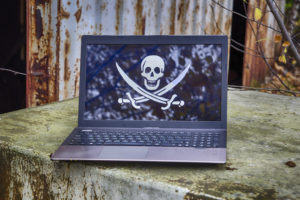What do you get when Dawson Leery becomes the Darth Vader of a dystopian Power Rangers universe? A bad-a** fanfic video, is what.
Produced by Adi Shankar; written and directed by Joseph Kahn; the 14-minute film — starring Katee Sackoff and James Van Der Beek — sheds the Power Rangers of their bubble gum sheen. The result? A de-sweetened depiction even David Fincher could love.
The Internet sure did.
But the Power Rangers’ copyright holder – Haim Saban of SCG Power Rangers LLC — wants to quash the viral fun, by way of a DMCA take down notice.
Does Saban have a valid copyright claim? Is Kahn’s short film a perfectly legal, satirical work within the lines of fair use?
Fair Use & The Power Rangers Copyright Battle
The United States fair use doctrine allows for the reproduction of copyrighted works in certain situations, like:
- reviews,
- commentary,
- satirical expressions, and
- teaching.
Fair use is one of the most popular – and effective – defenses against copyright infringement claims. And it sounds like Kahn studied up on his intellectual property law before releasing the film, as he explained:
“Every image in Power/Rangers is original footage. Nothing was pre-existing. There is no copyrighted footage in the short. I am not making any money on it and I refuse to accept any from anyone. It was not even Kickstarted, I paid for it myself. This was made to be given away for free. It is just as if I drew a pic of Power Rangers on a napkin and I gave it to my friend. Is it illegal to give pic I drew of a character on a napkin to someone for free? No.”
Essentially, Kahn is saying that his film is a commentary on the Power Rangers franchise, and, therefore, protected under the fair use umbrella.
The Argument Against Fair Use
Reasonable People Wouldn’t “Get It”
If this situation erupts into a lawsuit, Saban’s attorneys will undoubtedly argue that Kahn’s film is not fair use. The lawyers may claim that since the production value is so high, a “reasonable person” would assume it’s an official release, authorized by the MMPR copyright holders.
The crux of this argument relies on the ever elusive “reasonable person.” Asserting that a “reasonable person” would not understand Kahn’s rendition as parody or satire is a stretch, though, since the original MMPR franchise was a ubiquitous pop culture staple for nearly a decade. It may have been corny, but it was everywhere – and it was the opposite of “dark and gritty,” both literally and figuratively.
Not Transformative
Saban’s lawyers may also go the “not transformative enough” route. Historically, the more transformative a work of parody is, the more likely a judge is to deem it fair use. Since Kahn’s film is in the same medium as the original series, Team MMPR may try to argue that it’s too similar to the original.
Rights of the Copyright Holder
There’s also the question of how much control copyright owners should wield. The courts must deal with this question on a case-by-case basis since intellectual property rulings are largely dependent on context.
Satire, Parody, and The Power Rangers Copyright Battle
Kahn’s Power Rangers film is a parody wrapped in satire – a fact that bolsters the fair use claim.
Parody v. Satire
Both parody and satire are considered free speech expressions, and are legal in the United States. What’s the difference between the two?
Parody involves the manipulation of existing works, usually for comedic effect. Similarly, but not exactly, satire is exaggerated commentary on a frustrating or hypocritical issue.
The original MMPR was more “after school special” than “violence bacchanalia.” So, when considering Kahn’s film, it’s reasonable to describe it as a parody of MMPR, in the same way that Weird Al Yankovic’s “Eat It” is a parody of Michael Jackson’s “Beat It.” By presenting corrupted versions of the characters, Kahn argued, and we agree, that his work is a commentary on the original Power Rangers, in addition to Hollywood’s obsession with re-packaged ultra-violence.
In responses to the press, Kahn also touched on the parody/satire angle, asserting:
“Power/Rangers is meant as a satire, taking Hollywood’s ‘Dark and gritty’ reboot mania as far as it could go. The dark and gritty reboot thing is such a cliché that the intention was not only to make it dark and gritty but make it even darker and grittier than you could possibly imagine, hence the brains, the blood and the violence and the sex.”
DMCA Takedowns and The Power Rangers Copyright Battle
Enacted in 1998, the Digital Millennium Copyright Act outlines the federal rules for various Internet intellectual property issues, including a process for removing infringing content from the Web.
When faced with a DMCA takedown notice, some websites blink and remove the contested content immediately, regardless of the claim’s validity. Other websites, however, don’t comply unless they feel the requests are solid, and not the machinations of copyright trolls.
In this instance, for some still unknown reason, Vimeo opted to remove Kahn’s film. In response to an inquiry as to why site executives decided to remove the Power Rangers’ video, a Vimeo spokesperson explained:
“…as a host for user-generated content we are fully compliant with the notice and takedown provisions of the Digital Millennium Copyright Act. It looks like your video was removed due to a copyright infringement claim by: Tim Quinlan, SCG Power Rangers LLC.”
How will this all resolve? We have to wait. It’ll be interesting to see if Lionsgate Films (who is currently working on a development deal with Saban) bodyslams into the ring. The movie studios are in the long war to eradicate online piracy, but is the fanfic line one that entertainment executives want to cross? After all, engaged fans keep a whole lot of franchises in the green.
Kahn said he’ll “keep [the video] there until he gets a cease and desist.” So, grab some popcorn, because it is “legal morphing time!” Kahn’s Power Rangers satire may have only taken seven days to film, but the resulting fair use battle will probably last a lot longer.



Leave a Reply
Your email is safe with us.